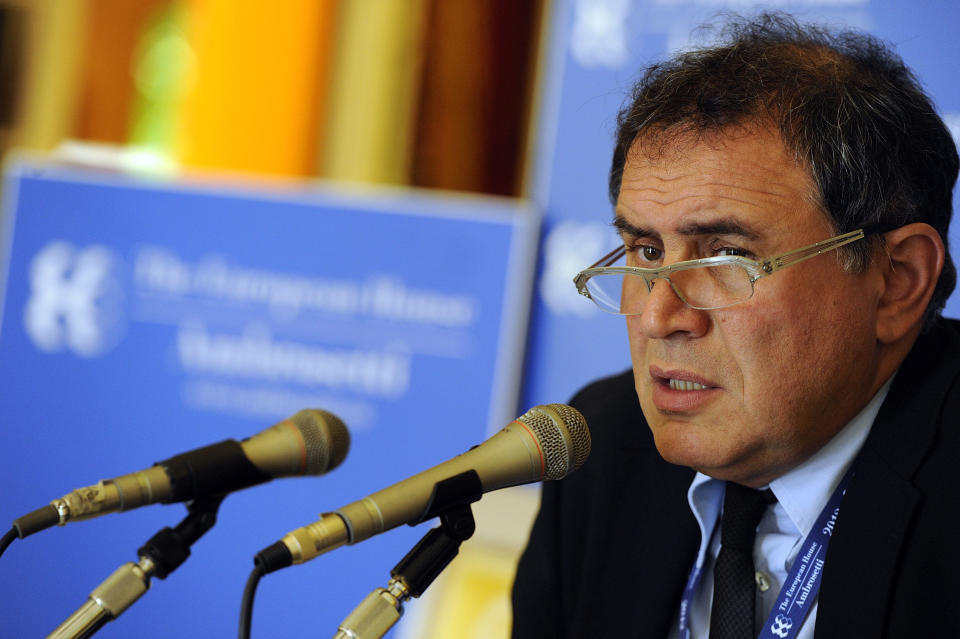Roubini doom scenario: It looks like 1914 again

With many parts of the world gearing up to commemorate the one hundredth anniversary of the start of the First World War, Nouriel Roubini has solidified his hold on the title "Dr. Doom" by suggesting parallels between 2014 and 1914.
There may be no Austro-Hungarian empire or Archduke Franz Ferdinand, but Roubini tweeted this from the World Economic Forum (WEF) in Davos today:
He then tweeted some of the reasoning behind this train of thought.
While Roubini is renowned for his bubble warnings and doom scenarios, his concerns weren't drawn out of thin air, but rather taken mainly from the lips of Japanese Prime Minister Shinzo Abe.
According to reports from both The Financial Times and BBC, Abe said on Wednesday that China and Japan were in a "similar situation" to that of Britain and Germany ahead of World War One.
(Read more: Timeline of latest flare-up in China-Japan tensions )
However, Reuters reported that Abe's top spokesman denied the Japanese leader meant war was possible or imminent, which is unthinkable for many.
Still, Abe said that China's increase in military spending was a source of instability in the region and he reiterated his calls for a military hotline to avert a conflict. In November, China tried to impose an air defense zone over a small collection of islands in the East China Sea, which the Japanese call the Senkaku Islands while the Chinese refer to them as Diaoyu.
Abe himself is a hawk. Back in December, he visited the controversial Yasukuni Shrine, which honors Japan's wartime dead, including those who committed atrocities during the country's march across Asia during the Second World War.
(Read more: Japan's PM issues veiled threat to China over arms race )
There are other areas of concern in the rest of the world for those seemingly keen to compare 2014 to 1914: the on-going Syrian civil war and its ramifications for the Middle East, as well as the future of Iran's place in the international community.
Furthermore, the current protests in Kiev and Ukraine's pro-EU or pro-Russia dilemma raise questions over the rising power of Russia and how Western powers deal with this.
Yet Roubini also mentioned the twin problems of a "backlash against globalization" and a "gilded age of inequality." The latter has been a watchword at Davos this year and has become the key focus of President Barack Obama's final term in office. In a speech to a think-tank in Washington D.C. last month, Obama described it as the "defining issue of our time."
(Read more: World's richest have same wealth as 3.5 billion poorest )
Perhaps 1914 isn't a good comparison, but rather 1848 and 1968 could be: the former a year of revolutions across Europe; the latter a year of socialist, communist and student protests in the U.S., U.K., France, Germany, Italy and the USSR. Will 2014 be the year when there is a growing backlash against the prevailing status quo and rising income inequalities?
Of course, it is worth noting that the written history of World War One has come under much scrutiny in recent months, as politicians and historians debate over revisionist theories and nationalistic fervor.
As Joseph Nye, a former U.S. assistant secretary of defense, has written: "Among the lessons to be learned from the events of 1914 is to be wary of analysts wielding historical analogies, particularly if they have a whiff of inevitability."
"War is never inevitable, though the belief that it is can become one of its causes."
-By CNBC's Kiran Moodley. Follow him on Twitter @kirancmoodley
More From CNBC
Lew: Dimon and I share 'incredulity' on bitcoin
Friction and long hours prompted El-Erian Pimco exit
Dimon: Economy starting to fire on all cylinders

